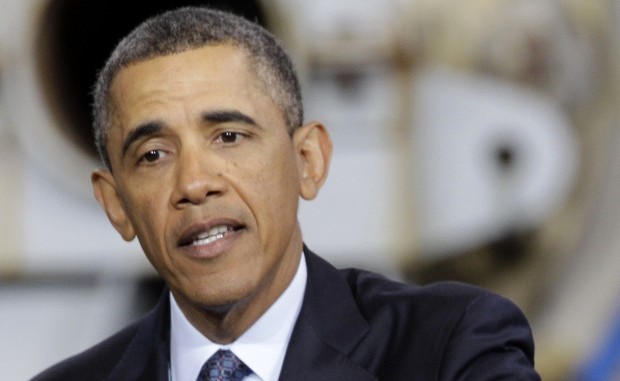
In this Feb. 26, 2013 file photo, President Barack Obama speaks in Newport News, Va. (AP Photo/Steve Helber, File)
Paris, Asharq Al-Awsat—Following the announcement that US President Barack Obama will visit Israel and Palestine for the first time next spring, Arab ministerial sources warned Asharq Al-Awsat that the US president has only a short window to advance peace.
They said: “Obama has 18 months to achieve something on the question of peace between the Palestinians and Israelis. Afterward, there will be the midterm elections and the presidential campaign, which will lead to a decline in interest in this issue.” The sources, which requested anonymity, say they have observed some “encouraging” developments that indicate a serious US effort to break the deadlock that has gripped the Palestinian-Israeli issue since 2010. The first of these is the reelection of President Obama, as well as the appointment of the veteran politician John Kerry, who is acquainted with the details of the standoff, as Secretary of State. The ministerial sources, speaking to Asharq Al-Awsat in Paris, say that “the new Obama” is qualified to be “more effective and decisive” than Obama in his first term.
The second element is the formation of a new Israeli government following the recent elections, which have seen the softening of the positions of Israeli Prime Minister Binyamin Netanyahu and his need to cooperate with political centrists, represented by Ya’ir Lapid, leader of Yesh Atid (There Is A Future) Party, who is nominated to be the foreign minister Re-launching the negotiations with the Palestinians was one of the items of his election platform. Until the new Israeli government arrives, the Arab sources say that Netanyahu will have to listen to the demands of the centrists, and not to close the door in the face of those who favor progress on the question of peace and the establishment of the Palestinian state. In addition, Netanyahu has no interest in clashing with Obama in the same way he did in the previous four years, which was characterized by poor personal relations between him and the US president.
There is also serious European and Arab pressure to push the US Administration to re-engage in the Middle East. Asharq Al-Awsat has obtained identical information from French and Arab sources that Paris, London, and Berlin are working on the draft of a new “roadmap,” which will be presented to the US President to urge him to re-commit to the Arab-Israeli issue and not be sidetracked by consequences of the “Arab Spring” and the Iranian nuclear program.
The Arab sources disclosed that the discussion today is focused on “conceptualizing a framework for resuming the negotiations without hitting the complex of settlement activity and halting it once again.” One option under consideration is to consider settlement activity a subject “that can be resolved through the agreement on the item concerning borders in the final-status negotiations.” Therefore, it is necessary “not to give Netanyahu a chance to weasel out of the negotiations” since settlement activity is picking up speed, with or without negotiations.
The Arab sources caution that there is “a pressing need” today for presenting implementable “ideas” to the US Administration. Washington “is not going to join the caravan to repeat the first experience of failure,” which it suffered with the resignation of Senator George Mitchell, the personal presidential envoy of Obama, who came to the conclusion, after months of shuttle tours, that settlement activity is too difficult an issue to resolve. In the estimation of the Arab ministerial sources, “presenting practical ideas on the table is something that can be followed and implemented” and will encourage the new US Administration, “which is free from [worries] about the next elections,” to press ahead.
Sources say that the Arab and European eagerness to expedite the re-launch of the negotiations under US sponsorship is due to worries that “the two-state solution window” has started to narrow because of the acceleration of settlement activity and the fear that the Arab Spring and the Iranian nuclear issue might completely grab international attention, let alone the difficult conditions experienced by the Palestinian Authority. The Arab sources expressed hope that Obama will bare his “new teeth” in dealing with Netanyahu.
In response to arguments that there is nothing that forces Netanyahu to “make concessions” on the Palestinian front because the Arabs are busy with their own problems, the Europeans are busy with their economic crises, and Obama is busy with his internal situation, the Arab sources say that Tel Aviv cannot continue to ignore Israel’s worsening strategic situation in the region and its deteriorating relations with the rest of the world.
The sources were likely referring to the fact that Palestine recently obtained the status of an observer state at the United Nations, while Israel’s relations with Turkey continue to be stormy, while there are increasing fears in Israel about developments in Syria and Egypt. Despite positive developments, the sources remained cautious in light of the previous failure of Arab-Israeli negotiations, and Netanyahu ability desire to stretch out negotiations and well-known reluctance to offer genuine concessions.
